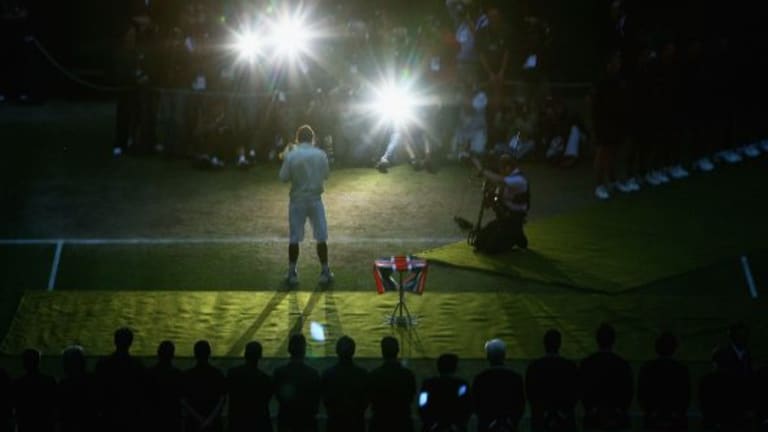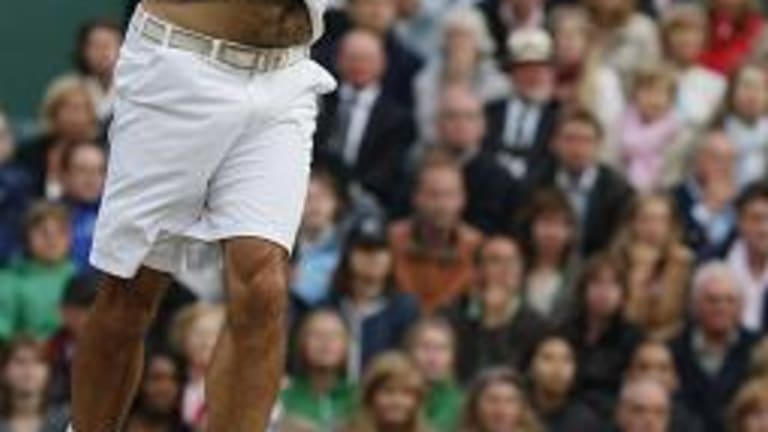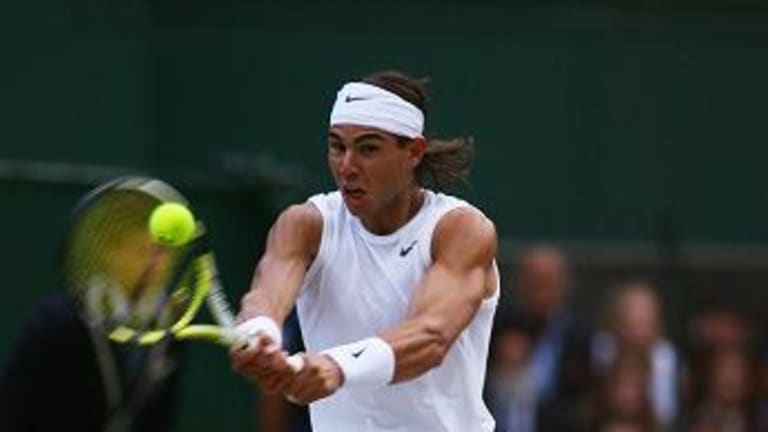Well, because there is nothing "easy" about Nadal's game, nor about the mission to which he set himself in recent years. It's always been clear that despite Nadal's proficiency on his beloved clay, the drive to unseat Federer - the man Nadal himself described as the "greatest player in history" in his own acceptance speech tonight - would constitute Nadal's education in tennis. He was both that precocious and that marked. It was, if you will, his destiny. And nobody fulfills a role of destiny without the ritual test; it's a staple of myth, folklore, saga and epic poetry.
For about three years now it's been pretty obvious that in a sharp and vital way, the "test" for Nadal was Roger Federer - more precisely, beating Roger Federer on something other than clay. Nadal was not obsessive about this, nor was he arrogant - if he were, he never would have come close. He never declared that he would be the man who shot Liberty Valence, or set out to lay low the best player in the world so that he might stand over his prostate body and bellow triumphantly. Instead, he saw Federer as the standard against which he might measure himself. As the test; nothing more, nothing less. How might he measure up, against one so lavishly talented and accomplished? That humility of Nadal's, upon which so many people remark? There it is, in a nutshell.
So it has all been a test, or rather a series of tests, to which Nadal has submitted. The parts of the test that he passed, he never dwelled upon or gloated over - has Nadal ever uttered a triumphant phrase or proud boast about his record on clay, or particularly his record against Federer at Roland Garros? Instead, Nadal looked to the grass at Wimbledon and, to a lesser extent, to the hard courts of North America.
After Nadal won tonight, he was asked to describe his emotions about winning Wimbledon, and he said: "Impossible to describe, no? I don't know. Just very happy. Is unbelievable for me have a title here in Wimbledon. Is probably well, is a dream. I always, when I was a kid, I dream for play here, but for win is amazing, no? For any Spanish player win here is unbelievable. For every player, no, but for the Spanish especially, because we don't have a lot of titles here, and have one is unbelievable."
What? No mention of the satisfaction of tagging Federer on his best surface? No fleeting reference to the hunt for the no.1 ranking? No coy allusion to taking his place among the great players of the Open era? No. He personifies that pious chestnut, "Think globally, act locally."
Given Nadal's background and history in the game, his quest to become a force in world tennis, instead of merely European clay-court tennis, has involved an intricate series of tests, all of them overshadowed by the ultimate test that any tennis player in recent years might have concocted - the challenge of beating Roger Federer at Wimbledon. This was the third year that Nadal took that test, and it was only fitting that the closer he came to passing it, the more the test came to seem like one of those Russian Matryoshka dolls. Each test nests in another, seemingly endlessly.
Win two sets, rolling in the third? How about a rain delay? Get Federer down, 15-40? How about an ace and one of those out of the world inside-out forehand placements? Get to match point? Hold on, Rafa. You ever see how quickly a coral snake strikes, when you poke him in the wrong place?
The final test for Nadal was that nasty tiebreaker in the fourth set - the one in which he built a 5-2 lead with two serves to come; he could have won the match without Federer having the opportunity to serve another ball. Up to that point, both men had played well. But that tiebreaker had another test nested inside the test: Nadal had never in his young life blown a match, flat-out screwed it up, the way he did by failing to win a tiebreaker that he led, 5-2, with two serves to come. At least he had never done that on anything like a big stage, against anyone like Roger Federer. If his competitive character was to be put to the ultimate test, this was it.
This is worth savoring. Nadal had never done what so many young players do: put himself in position to win when he isn't expected to, only to fail to win. It's a devastating, enervating, thoroughly awful - and utterly common experience. And Nadal acted out the narrative almost perfectly in that tiebreaker. At 5-2, he hit a let-cord double fault, then made an error on the backhand. Worse yet, Federer - being Federer - took full advantage of that uncharacteristic failure of nerve. Surviving that tiebreaker, he lifted his game, and it would remain at that higher level the rest of the way.


